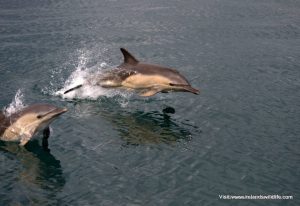
Like it or not… when you’re watching wildlife in Ireland you’re inevitably watching the weather.
With our Discover Wildlife Weekend looming I’d spent the last week watching the weather forecasts with growing trepidation. Would the weather gremlins play ball? West Cork is a truly spectacular wildlife location, but so much depends on what the weather decides to do on the day. It means you have to be nimble, you have to adapt, and you have to keep your itinerary fluid.
As the days ticked by the unstable weather refused to settle… making for a nerve wracking 48 hours leading up to the weekend… but the Friday afternoon was calm and dry, if a little overcast, and the weekend ahead looked promising — a couple of showers… but otherwise fine. It looked like we may even have some sunshine. Fantastic!
What a start!
Our group of intrepid wildlife explorers met up at The Celtic Ross Hotel in Rosscarbery — our base for the next few days and a fantastic hub for exploring the West Cork coastline. After a quick meet-and greet and an introductory talk on biodiversity and habitats, a quick night-time walk with the bat detector failed to yield any bats. It was a bit cold for flying insects, and with no food on the wing there was nothing to entice the bats. Undaunted we crossed to the pool across from the hotel, where a scan with the torch revealed a number of lingering black-tailed godwit on the mud. Then something moved in the reeds, and we saw the eye-shine of a mammal… then another… and another.
Sleek, fluid and utterly unperturbed three Otters worked the reeds and water’s edge on the far side of the pool. We watched them for a period, darting effortlessly in and out of the reeds, swimming across the channel and venturing out onto the mud to worry the roosting godwits — apparently for the sheer fun of it.
Everyone went to bed happy — especially the lady who’d asked “what are the chances of seeing otters this weekend?” earlier in the evening.
You never forget your first whale
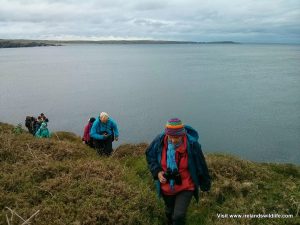
The next morning dawned dry, with a scattering of cloud and patchy sunshine. Ireland’s famous “four seasons in one hour” weather was at it again. It was impossible to predict what the day had in store. A stiff breeze from the north made it colder than normal for the time of year, but that northerly airflow was good news for what we had in store.
A leisurely stroll from the hotel along the estuary to the pier yielded great views of small groups of waders through the scopes, mostly curlew and black-tailed godwit. During autumn and winter Rosscarbery estuary is crammed with ducks and waders feeding on the tidal mudflats. Now, in early summer, all but these few stragglers had left for their breeding grounds further north. There were plenty of passerines singing in the hedgerow, and we took a moment to listen to the chorus of usual suspects: blackbird and robin, songthrush and goldfinch, chiffchaff and willow warbler. But our focus this morning was bigger… and more marine.
A short walk west from Rosscarbery pier along the cliffs brought us to a spectacular viewpoint overlooking the expanse of Rosscarbery Bay from Galley Head in the east across to Toe Head to the west. The view is breathtaking, and it’s a fantastic accessible spot for shore-based whale-watching. We settled down for a watch, scanning the sea with scopes and binoculars, looking for tell-tale signs of cetacean activity.
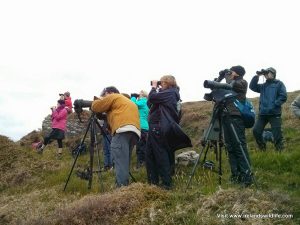
Watching whales and dolphins from shore demands calm seas — and the northerly breeze was playing right into our hands this particular morning. In the lee of the land the inshore waters of the bay were remarkably flat. It would have been a very different day had the stiff breeze been one of the prevailing south westerlies that routinely buffet this coastline.
Visibility was excellent, and it wasn’t long before we picked up our first minke whale of the morning.
We picked up around 6 in total during the watch, moving backwards and forwards across the bay, gannets and other seabirds in attendance. The group was thrilled to see them — a few spotted the whales immediately, for others it took a bit of time. Before long though everyone had their eye in and every member of the group had seen at least one whale. For most it was their first time seeing a whale in Ireland, and for some their first time seeing a whale ever.
It made for a memorable morning… but there was better to come.
All change: from coastal cliffs to broadleaf woodland
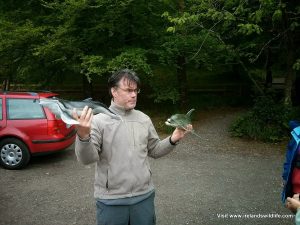
After a leisurely lunch at the hotel to warm up and revitalise we car-pooled for the afternoon trip to a local woodland just a few miles up the road. Drommilihy, near Connonagh, just off the main N71 Cork-Skibbereen road, is a lovely naturalised beech woodland that is simply magical in spring and early summer. The stark contrast to the wild coastal splendour of the morning outing only served to heighten the woodland’s appeal as we walked around the looped trail.
There’s something truly magical about the quality of light under a beech canopy at this time of year. The way it filters through the gently shifting, translucent leaves gives the woodland a wonderfully ethereal quality. It felt a bit like a film set for “Lord of the Rings”.
We added several woodland bird species to the weekend tally, with highlights including cryptic little treecreepers, various tit species and a memorable encounter with a newly fledged blackcap family, with mum and dad visiting the posse regularly to bring food. The stars of the show though were the bluebells carpeting the woodland floor. Although past their best by now they still had that “wow” factor that bluebells have — and it was only accentuated by the magical beechwood light.
The rain started just as we got back to the hotel: perfect timing. We rounded off the afternoon with a talk covering a selection of local wildlife, fieldcraft, equipment and a look at the benefits of wildlife watching for people and for conservation.
The talk at the group meal that night was all about the day’s wildlife experiences, and the exciting prospect of a boat trip the following morning.
Marine wildlife watching at its best
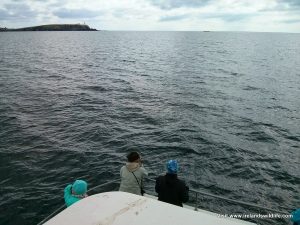
When you’re looking for marine wildlife it is quite surprising what you can see from shore when you know what to look for and conditions are right — but to really make the most of the wildlife watching opportunity there’s no substitute for getting out on the water.
The following morning was fine, and the wind had dropped to almost nothing — near perfect conditions for our whale watching / marine wildlife cruise with our Discover Wildlife Weekend whale watching partner Cork Whale Watch. We all piled out of the cars at Reen Pier and climbed aboard the Holly Jo with skipper Colin Barnes. As we left the harbour we cruised along the coast and around High Island and Low Island for close encounters with Atlantic grey seals and common seals. We saw countless seabirds, including diving gannets, manx shearwaters, fulmars, guillemots, razorbills, puffins and storm petrels — and in close to the cliffs we had stunning views of nesting shags, ravens and of course choughs as they soared acrobatically on the updrafts.
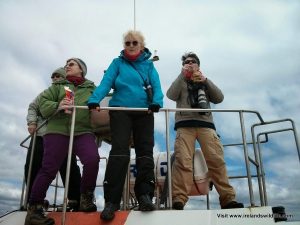
But it was the whales and dolphins that stole the show. We encountered 6-8 minke whales south of the cliffs in Rosscarbery where we’d watched from shore the day before. The experience of getting out on the water with the very whales we’d seen through scopes and binoculars the previous day was exhilarating, and something everyone on board is likely to remember for a long time to come.
Bow-riding common dolphins were the icing on the cake. There were literally hundreds in the vicinity, feeding on the huge aggregation of sand eels that had attracted the whales. Several groups made a bee line for the Holly Jo during the course of the trip and spent some time cruising alongside and just in front of the boat — providing a wonderful spectacle and some great photo opportunities.
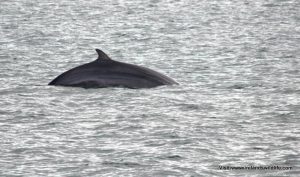
The 4 hour trip simply flew by and before we all knew it we were returning to Reen Pier to say our goodbyes after a truly superb weekend of wildlife on the spectacular West Cork coast. It proves once again that, on its day, Ireland can rival anywhere in the world when it comes to memorable wildlife experiences.
For more details on Discover Wildlife Weekends run by Ireland’s Wildlife on the West Cork coast please check this page.
We generally run the weekends in spring and autumn, which is when we get the most wildlife activity. Due to other commitments we won’t be running weekends in autumn 2014, but will be scheduling dates for 2015 soon. If you’d like to stay in the loop when we add weekend dates or other wildlife experiences to the Discover Wildlife Calendar simply subscribe to our mailing list below and we’ll make sure you’re one of the first to know when we post updates.
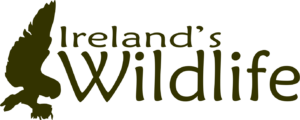


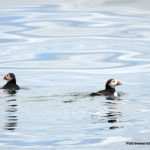
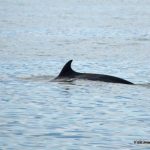
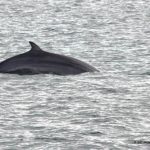
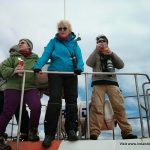
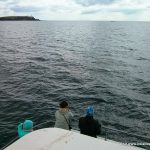
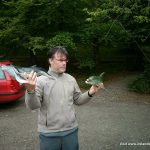
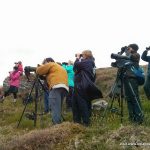
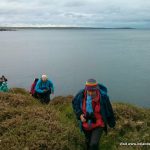
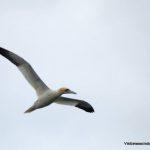
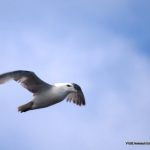
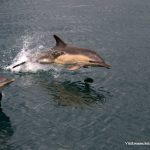
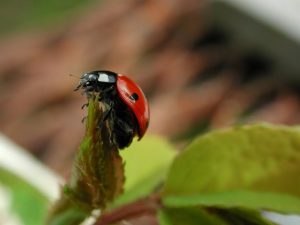

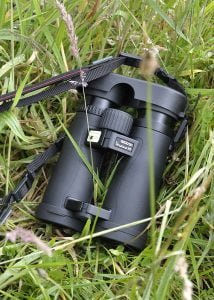



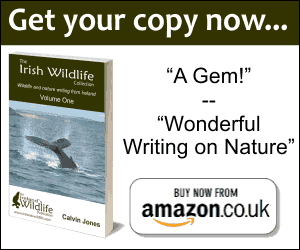

1 comment
Celia Bartlett (@ailecphoto)
So glad you had a successful weekend. The puffins and dolphins were noteable by their absence our last trip out – but that is the way with nature watching!